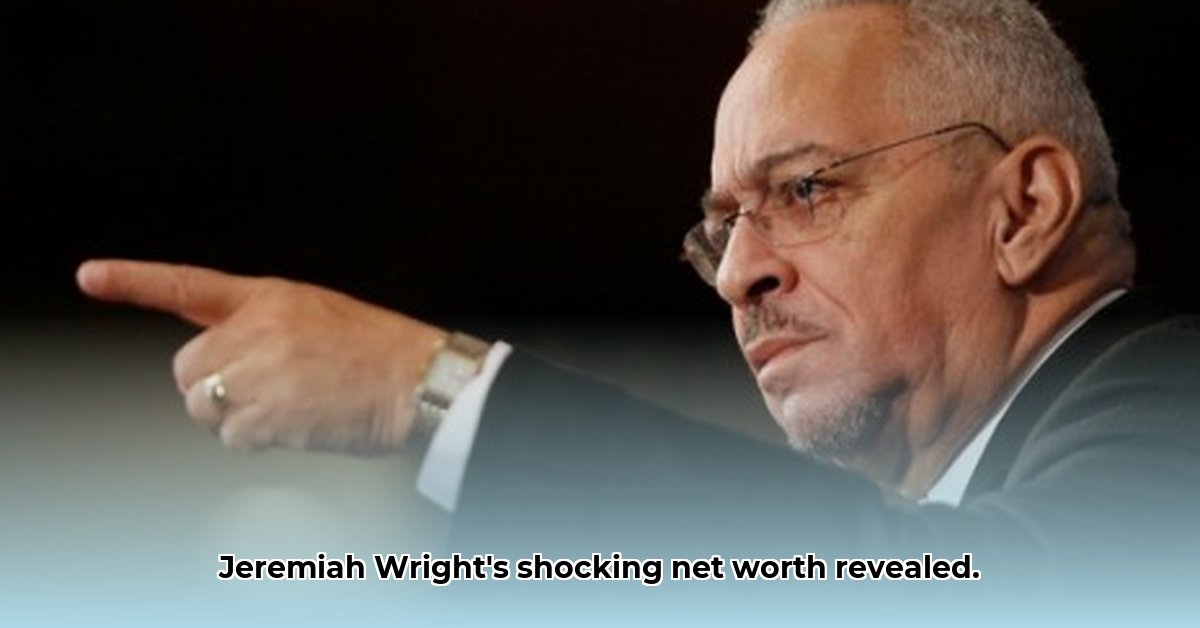
The 2008 presidential election wasn't solely defined by policy debates; it was punctuated by unexpected controversies, one of the most prominent involving Barack Obama's former pastor, Jeremiah Wright. While questions surrounding Jeremiah Wright's net worth emerged, they were ultimately overshadowed by a larger narrative concerning race, religion, and the potent influence of media narratives. For more on his finances, see Wright's net worth.
The Sermons and Their Fallout
Jeremiah Wright, a prominent Chicago pastor, delivered sermons containing critiques of American foreign policy and race relations. Selected excerpts, often presented out of context, were amplified and disseminated during the presidential campaign, igniting a national debate. This wasn't merely about the content itself; it was about the selective framing and manipulation of Wright's words to fit pre-existing narratives. His passionate pronouncements, including the controversial “God damn America” remark, fueled a firestorm of political discourse.
The Elusive Net Worth: Unpacking the Discrepancies
Determining Jeremiah Wright's net worth has proven remarkably difficult. Estimates vary significantly, ranging from a reported $5 million to figures as low as $100,000. This discrepancy stems from several factors. Religious leaders often don't publicly disclose their finances. Moreover, accurately valuing assets like church property and related investments is complex. The various methodologies employed in estimating net worth may also account for the significant variations. The lack of transparency surrounding Wright's finances highlights the challenges in precisely determining the wealth of individuals not subject to regular public scrutiny. This uncertainty ultimately served as a distraction from the central debate concerning his sermons.
Obama's Response and Media Influence
Barack Obama responded directly to the controversy in his powerful “A More Perfect Union” speech in Philadelphia. He acknowledged Wright’s influence but unequivocally condemned his most inflammatory statements. This response attempted to navigate the complexities of personal history and political realities. However, the media’s role was crucial. News outlets and commentators shaped the narrative through their selection of quotes, framing of the issue, and the overall narrative they presented to the public. This raises important questions about responsible journalism and the potential for media bias to influence public opinion.
Beyond Dollars: A Broader Dialogue
While Jeremiah Wright's net worth garnered attention, the controversy's significance lies in the broader issues it highlighted. It exposed deeply rooted racial tensions in the U.S., demanding a critical examination of America’s history and its ongoing struggle for racial equality. The controversy also sparked a national discussion on the intersection of faith, politics, and public discourse, prompting reflection on the responsibility of religious leaders and the role of the media in shaping public opinion.
Lasting Impact and Unanswered Questions
The precise figure of Jeremiah Wright's net worth remains elusive, yet its impact is undeniable. The controversy serves as a stark reminder of the delicate balance between freedom of expression and the potential for inflammatory rhetoric to disrupt the political landscape. The episode continues to fuel discussion about responsible media coverage and the ongoing need for a productive national discourse capable of addressing complex issues like race and religious expression. While the financial details are unclear, the social and political ripples of the 2008 controversy continue to shape the American political landscape. It remains a case study in the power of narrative, the importance of context, and the influence of media in shaping public perception.
How the Controversy Shaped the 2008 Election
The controversy surrounding Rev. Jeremiah Wright's sermons significantly impacted the 2008 election. Wright's outspoken criticisms of U.S. policies and racial injustices became a central point of contention, raising questions about Barack Obama's association and its potential impact on his campaign.
The Sermons' Impact
Wright's sermons, delivered over many years, contained provocative statements concerning American foreign policy and systemic racism. Selected excerpts, amplified by media coverage, presented a narrative of Wright as a radical figure. This prompted a national discussion, forcing Obama to address his relationship with his former pastor and to denounce Wright's most inflammatory statements. The ensuing debate became a defining moment, exploring the intersection of race, religion, and political discourse in the U.S.
The Net Worth Distraction
Amidst this, questions about Jeremiah Wright's net worth emerged as a secondary, tangential narrative, adding another layer of complexity to an already tense situation. The lack of transparency around his financial status, coupled with the varying estimates, served as a source of further speculation and perhaps a distraction from the core issues at play. This highlighted the difficulty of assessing the wealth of private individuals, especially those not subject to public financial disclosures.
Election Impact Analysis
The Wright controversy posed significant challenges to Obama's campaign, demanding considerable attention and potentially alienating certain voter segments. The controversy also highlighted the challenges faced by candidates in balancing personal relationships with political realities and maintaining a broad appeal to a diverse electorate. The long-term effects of the controversy on the electoral outcome remain subject to ongoing debate and analysis. However, it undoubtedly marked a pivotal point in the 2008 election, illustrating the complexities of political discourse and the intersection of faith and political commentary in the U.S.